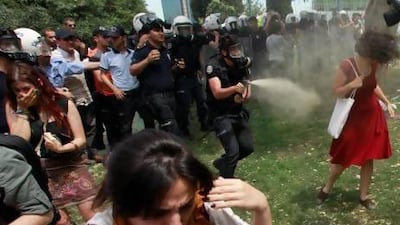ISTANBUL // In her red cotton summer dress, necklace and white bag slung over her shoulder she might have been floating across the lawn at a garden party; but before her crouches a masked policeman firing teargas spray that sends her long hair billowing upwards.
Endlessly shared on social media and replicated as a cartoon on posters and stickers, the image of the woman in red has become the leitmotif for female protesters during days of violent anti-government demonstrations in Istanbul.
"That photo encapsulates the essence of this protest," said the maths student Esra at Besiktas, near the Bosphorus strait and one of the centres of this week's protests. "The violence of the police against peaceful protesters, people just trying to protect themselves and what they value."
In one graphic copy plastered on walls the woman appears much bigger than the policeman. "The more you spray the bigger we get", reads the slogan next to it.
The United States and the European Union as well as human rights groups have expressed concern about the heavy-handed action of Turkish police against protesters.
There were others dressed in more combative gear and sporting face masks as they threw stones, but the large number of very young women in Besiktas and on Taksim Square where the protests began on Friday evening is notable.
With swimming goggles and flimsy surgical masks against the teargas, light tasselled scarves hanging around their necks, Esra, Hasine and Secil stand apprehensively in the Besiktas district on Monday evening, joined by ever growing numbers of youngsters as dusk falls and the mood grows more sombre.
They belong, as perhaps does the woman in red, to the ranks of young, articulate women who believe they have something to lose in Erdogan's Turkey. They feel threatened by his promotion of the Islamic headscarf, symbol of female piety.
Many of the women point to new abortion laws as a sign that the prime minister, Recep Tayyip Erdogan, who has advised Turkish women to each have three children, wants to roll back women's rights and push them into traditional, pious roles.
"I respect women who wear the headscarf, that is their right, but also want my rights to be protected," said Esra. "I'm not a leftist or an anti-capitalist. I want to be a businesswoman and live in a free Turkey."
Protesters are coming better prepared now than when the unrest first began. Some have hard-hats, some are dressed all in black, most wear running shoes. But many are dressed as femininely as the girl in the red dress snapped on Taksim Square.
"Of course I'm nervous and I know I could be in danger here. But for me that is nothing compared to the danger of losing the Turkish Republic, its freedoms and spirit," said the economics student Busra, 23, who says her parents support her protest.
* Reuters

